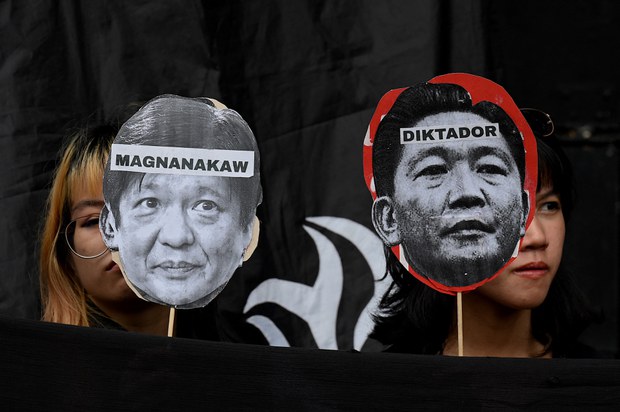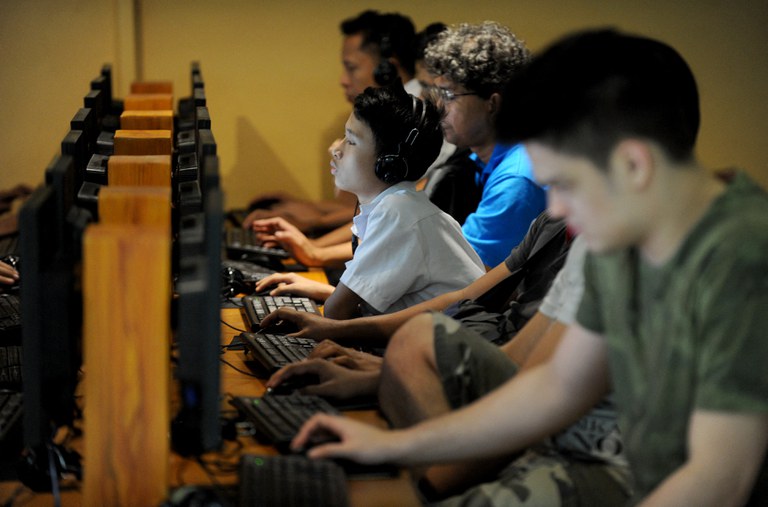Report: Internet freedom in Philippines deteriorated sharply in 2022
2023.10.04
Manila and Washington
 Protesters hold photos of former Philippine president Ferdinand Marcos Sr (R) and present President Ferdinand Marcos Jr as they join a protest commemorating the 51st anniversary of the imposition of Martial Law, at Liwasang Bonifacio in Manila, Sept. 21, 2023.
Protesters hold photos of former Philippine president Ferdinand Marcos Sr (R) and present President Ferdinand Marcos Jr as they join a protest commemorating the 51st anniversary of the imposition of Martial Law, at Liwasang Bonifacio in Manila, Sept. 21, 2023.
The Philippines, next to Iran, recorded the world’s sharpest decline in internet freedom last year despite a change in governments, according to a report released Wednesday by Freedom House.
The year 2022 saw the 13th consecutive decline in overall global freedom on the World Wide Web with governments exploiting the emergence of artificial intelligence (AI) and the technology’s vast automated capability to deepen digital repression, the U.S.-based NGO reported.
Freedom House rated the Philippines as “partly free” but said it had dropped from No. 21 to No. 26 in its rankings of 70 countries for internet freedom.
In mid-2022, Ferdinand Marcos Jr., the namesake son of a late Filipino dictator, succeeded President Rodrigo Duterte, who was widely criticized during his six years in office for policies that were seen as repressive and hostile to the press.
“Newly elected leaders also sought to reshape the online environment to their benefit. The Philippines suffered this year’s second-largest decline in internet freedom,” the report said.
After winning the 2022 general election, “President Ferdinand ‘Bongbong’ Marcos Jr., son of a Cold War-era dictator, signed a law in October 2022 that required all Filipinos to register their SIM cards under their real name, undermining anonymous communication in what remains a dangerous environment for journalists and activists,” Freedom House said.
“Marcos also left in place a blocking order that restricted 27 websites, including several news outlets known for critical reporting; it had first been imposed by outgoing [P]resident Rodrigo Duterte in June 2022, under an antiterrorism law that has been a frequent tool of government overreach,” the report also said about the Philippines.
The climate for internet freedom there worsened after Duterte enforced the antiterrorism law to block news websites that had criticized his administration, the report said.
The report by Freedom House also cited instances of arrests and other legal actions for alleged cyberlibel, including against Rappler, a prominent online Philippine news website.
“In January 2023, the Court of Tax Appeals acquitted Rappler and its chief executive Maria Ressa of four charges of tax evasion filed by the Duterte government in 2018,” it said.
“However, Rappler faced three other cases during the coverage period, including a pending appeal against a closure order.”

Freedom House, which measures the degree of freedom and civil liberties worldwide, also honed in on the Islamic Republic of Iran and Myanmar, where that country’s military rulers have cracked down violently on dissent in the wake of their 2021 coup.
“Digital repression intensified in Iran, home to this year’s worst decline, as authorities shut down internet service, blocked WhatsApp and Instagram, and increased surveillance in a bid to quell antigovernment protests. Myanmar came close to dislodging China as the world’s worst environment for internet freedom, a title the latter country retained for the ninth consecutive year,” the report said.
In terms of the level of decline, Iran and the Philippines were followed by Belarus, Costa Rica, and Nicaragua.
Rising threat from AI
The thrust of the Freedom House report focused on how governments are increasingly using AI as a tool for repression.
“AI can be used to supercharge censorship, surveillance, and the creation and spread of disinformation,” Michael J. Abramowitz, president of Freedom House, said in a statement that accompanied the report’s release.
“Democratic states should bolster their regulation of AI to deliver more transparency, provide effective oversight mechanisms, and prioritize the protection of human rights,” he added.
Human rights conditions were found to have worsened in more countries than those that saw an improvement.
“In more than three-fourths of the countries covered by the project, people faced arrest for simply expressing themselves online. And governments in a record 41 countries resorted to censoring political, social, or religious content,” Freedom House said.
Jeoffrey Maitem contributed to this report from Manila.







